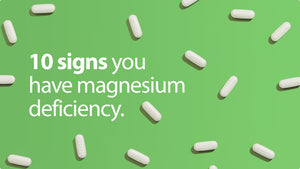Thomas DeLauer breaks down the science behind using intermittent fasting to improve your mood on the latest #ScienceSaturday.
Subscribe for more Health & Nutrition education with Thomas DeLauer.
Click here to add 3 bottles of Jigsaw Adrenal Cocktail to your cart and save $30.94 + Free Shipping.
Transcript by Rev.com
- What's going on Jigsaw Land. Today I wanna talk about how you can boost your mood. I'm always talking about how magnesium's good for the brain, but what about simply not eating for a little while. So in this video, I'm gonna break down how fasting affects something known as brain-derived neurotrophic factor.
- Let's get down to the geeky science. Before we can start to understand how fasting literally affects the brain, we have to understand something known as brain-derived neurotrophic factor, BDNF. BDNF is a naturally occurring growth hormone that helps promote what is called neuroplasticity.
- Neuroplasticity is the brain's ability to migrate and shape shift. So you see, we used to think that once you lost a brain cell, you lost it for good. But nowadays, we know this BDNF thing allows our brains to produce new brain cells. And if we have adequate amounts of BDNF, we can produce new brain cells but also preserve existing brain cells. Not only can we keep our brain from sort of dying off, we can actually help support new growth, especially when it comes down to memory.
- So what we have to look at is the relationship between fasting and BDNF. Fasting has been shown in multiple studies to improve brain-derived neurotrophic factor, but specifically when it has to do with synapses. See, synapses are where neurotransmitters travel from cell to cell.
- So without synapses, we don't have the ability to send signals through serotonin or dopamine or any of those neurotransmitters. So fasting has been shown to promote that. In fact there was actually a study that was published in the Journal of Neurochemistry that found that simple bouts of intermittent fasting for just a few weeks could improve your BDNF levels anywhere form 50% all the way up to 400%. That's pretty darn alarming.
- Now that we're starting to understand how powerful BDNF is, this particular study just gained a heck of a lot more clout. Now we already know that fasting helps promote BDNF, which is powerful and cool in and of itself, but fasting specifically helps BDNF when it comes down to synapses. It promotes what is known as synaptic plasticity.
- Now synaptic plasticity is a lot like simple brain plasticity, except it has to do with our synapses. Remember, synapses are what allow neurotransmitters to do their thing. When we have synaptic plasticity, it means that we're able to modulate our moods a lot better. For example, we're able to strengthen a synapse or weaken a synapse, whenever possible. You might be wondering why would I ever wanna weaken a synapse? Well, let me give you an example.
- You wouldn't wanna constantly have a surge of serotonin going when you don't need one. When you're scared or you're frightened, why would you want the feel-good hormone to be pumping? You wanna be frightened because that's gonna allow you to do the job that you need to do to get out of harm's way. Same kind of thing with dopamine. You don't want that synapse wide open for dopamine when you're touching a hot stove. Dopamine is your reward system, so why would you want to be signaling to your brain that it feels good to touch a hot stove? Sometimes we wanna weaken a synapse. Sometimes we wanna strengthen it. With BDNF and fasting, we're able to promote that modulation a lot better.That's exactly why it's called synaptic plasticity.
- We have now made those synapses more flexible. Plasticity is more like a word for flexibility, to be completely honest. When we have this process occurring through fasting, it's making us more flexible with our moods. We can dictate how we feel and adapt to a scenario much better.
- That's why when you're fasting, you have the ability to turn your brain on and off really fast. If you've ever done a bit of intermittent fasting, you know how crystal clear your brain feels and you know how in the zone you can be when you need to be. It all has to do with that BDNF.
- Now additionally, there's a pretty cool reciprocal arrangement with serotonin and BDNF. Fasting increases BDNF, but BDNF also increases serotonin. Serotonin signaling within the body increases BDNF expression. So we have this perpetual cycle of more serotonin when we need it and more BDNF.
- Now BDNF expression means that you're actually triggering the genetic process for your body to create more BDNF which therefore creates more brain cells and protects more brain cells. We're actually affecting our cells at the genetic level. We are affecting our DNA and our genes by fasting and improving our levels of BDNF.
- Now there's a pretty interesting relationship between fasting and serotonin and fasting and BDNF. And there's one particular study that was published in the Journal of Neurology that looked at Ramadan; took a look at subjects that were going through Ramadan.
- Now in case you don't know what Ramadan is, it's a period of time that Muslims celebrate that is a month long, where they essentially intermittent fast. It's a perfect natural case study to take a look at the effects of intermittent fasting.
- So they took a look at 29 subjects and what they did is they measured levels of BDNF and serotonin two days before they began their fasting. Then they also measured it 14 days into their intermittent fasting regimen and then they measured it 29 days in. What they did is they looked at the spectrum of all three of these groups. So they took a baseline of BDNF and serotonin two days before.
- Then what they found is 14 days with intermittent fasting, they had an improvement of 25% with their brain-derived neurotropic factor. Then at the end of the study, after 29 days, they found there was a 47% improvement in BDNF. But then it gets even better when it comes down to serotonin.
- They found that in the second group, after just 14 days, there was a 33% increase in serotonin levels. Then, at the end of the study, after 29 days, they found that there was a 43% increase in serotonin. If you remember the relationship between serotonin and BDNF by helping support both of those, we can really skyrocket our overall levels of BDNF over time. This is after just a month.
- So again, I know this video has focused more so on BDNF than anything, but I wanted to do this video to prove to all the naysayers out there that say that you're killing brain cells by starving yourself. I wanted to help everyone understand that fasting is a powerful way to support your brain and to give your brain the fertilizer that it needs to not only recycle old cells but protect the ones that are existing and encourage the growth of new ones. Believe it or not, by not eating, you can grow something new.
- As always, my Jigsaw friends, if you wanna learn how you can support your brain in all the possible ways, make sure you click on through and learn a little bit more about Jigsaw magnesium products so you not only can improve your brain through BDNF, but you can also improve your brain through the proper balance of minerals. I'll see you on the next page.





















